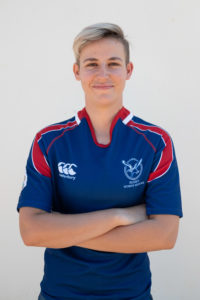
1) You have recently been appointed the Namibia National Women’s rugby coach. What does this achievement mean to you?
– Being appointed as the first women to coach the Namibia women’s team is an absolute dream come true and an honor. I can’t be more thankful and this opportunity is unexplainable.
2) As a Rugby Africa Unstoppable, how do you think your position as an ambassador for women’s rugby on the continent will contribute in this new exciting time of your rugby career?
– Representing my country has always been my greatest achievement. Being an Unstoppable just took it a notch further and now I get to lead the next generation to even greater heights not only in Namibia but with the reach I have as an Unstoppable I can hopefully inspire a future women’s rugby coach somewhere within the continent.
3) What are your ambitions with the Namibia national team as you step into this new and exciting role?
– The first order of business is to see exactly where we are as a rugby nation within the women’s game in Africa. When we have established that we can clearly layout our plan, then we can work on a mission and vision, of how we can get to the point of being competitive on the African circuit.
4) How long have you been coaching (and the teams you have coached) and have you always aspired to be a national coach?
– I stated coaching in 2015 while being off after my first injury (ACL partial tear in left knee) a friend got me to help her out with a boys team at Orban Primary School. We coached the team for 4 year together taking them from u/10 to u/13.
– I then got my level 1 & 2 sevens certificates in 2019.
– 2020 -2021 I had the honor of helping rebuild the Windhoek High School (WHS) girls rugby.
– 2020 -2021 While coaching WHS I also started off at Wanderers Rugby club.
5) How did you get into rugby?
– Rugby has always been a part of my life, growing up supporting my father, former National player (15’s & 7’s) Jaco Kotze, from the side-lines.
In 2013 was the first time I saw women’s rugby being played in Namibia, I joined a club the following Monday, and as they say, the rest is history.
6) You are also a former national player, tell us about your playing career – where did it begin and which teams did you represent?
– I joined Phoenix Rugby Club in 2013.
– In 2014 the first women’s sevens team was selected which I formed part of, touring to Kenya to play in the CAR 7’s Tournament.
– 2015 I once again got selected for the team where we travelled to SA, it’s at this tournament where I scored the first ever points for Namibia. It was also at the tournament that I tore my ACL for the first time
– In 2016 we travelled to Zimbabwe this time I travelled as the Vice-Captain.
– All three of these tournament taught me and us as a team in general so much about the level of play in Africa. It was an absolute honor, but we learned some hard lessons along the way that helped us improve.
– My playing career was short lived, it was after this tournament that I tore my knee for a second time, this time it was a grade 3 tear ending with me getting reconstruction surgery.
– Although my national playing career was short lived, I got a taste of it and knew then that I wanted to be a part of the untapped talent in Namibia and also help grow the unseen talent.
7) Given how few female national coaches there are in Africa, what are your words of encouragement for women interested in coaching?
– I know as women in this male dominated sport code, things can get tough for us at some points, but it’s through believing in yourself, your dreams and having a “WHY” bigger than yourself that you will break through all obstacles and prevail. Keep working on your craft and be patient in your journey.
8) What do you love the most about the game of rugby?
– The diversity of people involved in all aspects of the game, both on and off the field.
9) What do you think are the keys to growing women’s rugby both in Namibia and in Africa?
– Putting an emphasis on grassroots development of the sport.
– More local and regional competitions within and among countries on the continent – to create sustainability of players.
10) What is your vision for women’s rugby in the next five to ten years and do you think the sport has a bright future on the African continent?
– Vision – To see the numbers grow tremendously on all levels from grassroots to National & with that an increase in the level of play to ultimately be competitive on the world stage.
– Bright future – Yes, I think Africa can be a great contender on the global scene, just off pure talent along, just imagine what the ladies will be able to do when they are given a fair shot.
